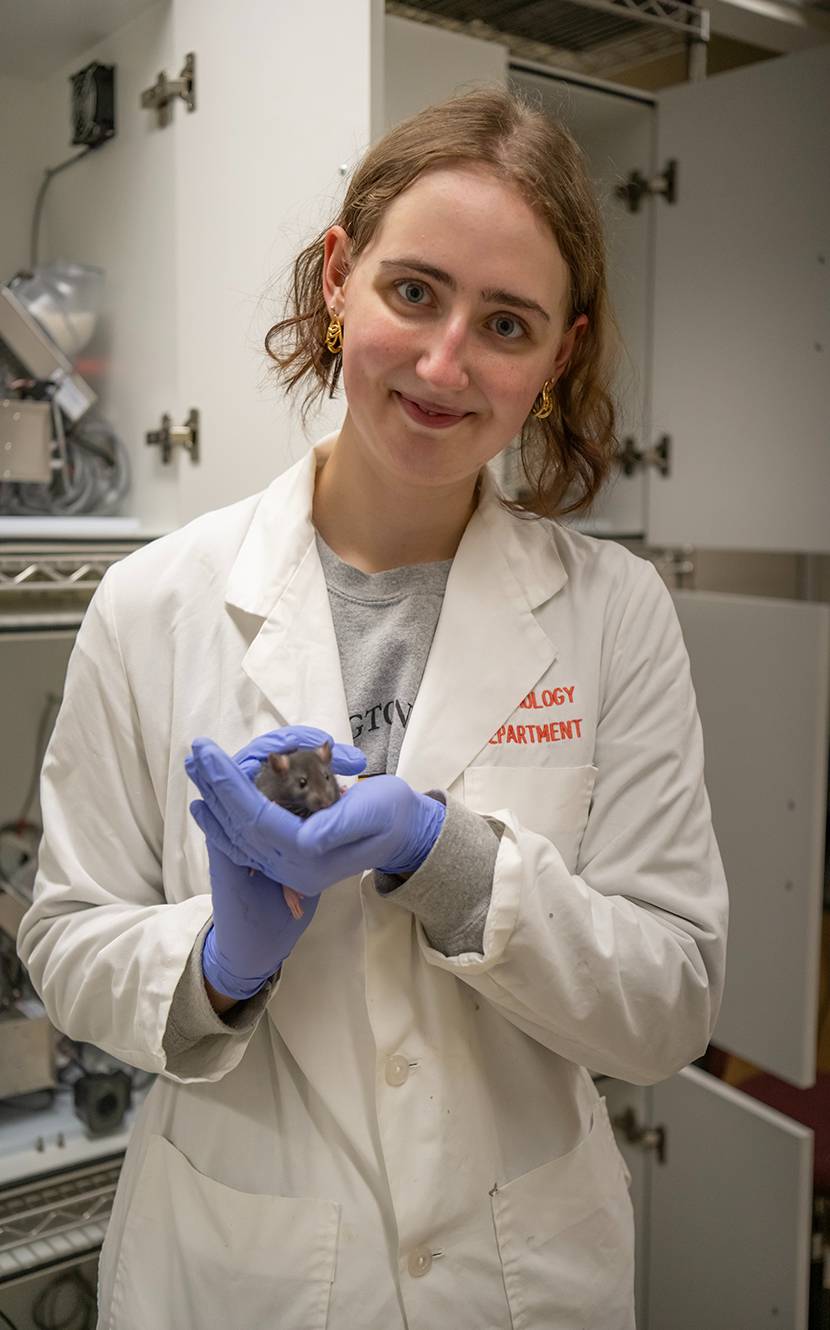
MAJORS AND MINORS
- Neuroscience and Sociology Majors; Public Health Minor
- Pre-Health Professions Program Premedical Track
EXPERIENTIAL LEARNING
- John S. Toll Research Fellow
- Research at University of Maryland Baltimore Medical School in the Calu Lab; Research at Rutgers Medical School in the James Lab
CAMPUS ACTIVITIES
- Student Government Association, EROS, HOSA, American Chemical Society
- Academic Skills Tutor, Course Mentor, Teaching Assistant
- “It felt really nice to know that I could ask the stupidest question in office hours, but to my professors it wouldn’t be stupid because they genuinely want to help you understand. I really appreciate that, and I don’t think I would have been able to grow and learn as much as a person had I gone to a bigger school. I’ve really grown to appreciate the resources that I find here.”

From Micro to Macro
Caroline Drupka '25
Madison, New JerseyMAJORS AND MINORS
- Neuroscience and Sociology Majors; Public Health Minor
- Pre-Health Professions Program Premedical Track
EXPERIENTIAL LEARNING
- Research at University of Maryland Baltimore Medical School in the Calu Lab; Research at Rutgers Medical School in the James Lab
CAMPUS ACTIVITIES
- Student Government Association, EROS, HOSA, American Chemical Society
- Academic Skills Tutor, Course Mentor, Teaching Assistant
- “It felt really nice to know that I could ask the stupidest question in office hours, but to my professors it wouldn’t be stupid because they genuinely want to help you understand. I really appreciate that, and I don’t think I would have been able to grow and learn as much as a person had I gone to a bigger school. I’ve really grown to appreciate the resources that I find here.”
That intersection led her to a double major in neuroscience, where she could understand
the chemical functions in the brain and the health effects they have, with sociology,
which explains human interaction on a societal level.
“I'm interested in the actual brain, the chemicals and the nitty gritty of everything, and how drugs interact with your receptors,” Drupka said. “I've also always found it interesting to see people as a whole on a macro scale, so having really itty-bitty stuff and then seeing how it all works on a global scale I find very interesting.”
Drupka's academic résumé is rounded out by her participation in the Pre-Health Professions Program's premedical track. Through that program, Drupka is preparing her application materials to pursue an M.D.-Ph.D. after graduation. Additional advising on suggested courses and resources through the program ensures Drupka has all of the pre-requisite courses needed for medical school and has put her in touch with a neurosurgeon M.D.-Ph.D, who she will shadow in January.
“A lot of people are not interested in research and having that connection into the interdisciplinarity between medicine and research, but I really like it,” Drupka said. Premedical track advisors Elizabeth Yost, associate professor of sociology and director of the pre-health professions program, and Phil Ticknor, coordinator of the pre-health professions program, check in with Drupka and other program participants regularly, answering questions and providing resources and opportunities.
While some of the opportunities Drupka has taken advantage of have come through Yost and Ticknor, the research internships Drupka completed in different university labs came through connections made by Daniel Kochli, assistant professor of psychology.
Those research internships taught Drupka how to set up a research question and provided new procedures and tools that she is using to conduct her Senior Capstone Experience (SCE).
“Dr. Kochli has provided me a lot of different opportunities and connections with labs,” Drupka said. “Without him, I don't think I would have been able to really get to know the people I've researched with and have these experiences.”
For her SCE, Drupka is trying to determine if the psychomotor vigilant test—which measures sustained attention—can effectively measure the same symptoms of schizophrenia as those used in past literature and be a valuable model for future research. Her research is intended to be translational, so while Drupka is conducting the test on rats, she plans to use the data she collects to determine what would be next steps for pre-clinical and clinical studies for human application. The sociological side of the SCE will investigate if mental health providers on the Eastern Shore have enough knowledge about schizophrenia and seeing how that knowledge impacts their choices in psychiatric or therapeutic practices.
While the fall semester has focused on the neuroscience portion of the SCE, preparing the rats and running the test model, her focus in the spring will be sending out surveys to mental health providers and investigating the sociology side of her project.
Drupka will present her SCE research at a conference in March. She has attended and presented her research at several conferences over her time at Washington College, including at the Eastern Psychological Association conference.
“I don't think I would have been able to grow and learn as much as a person had I gone to a bigger school,” Drupka said, talking about not only the opportunities she was able to take part in, but also the funding she secured to support those pursuits, namely the John S. Toll Research Fellows program. “I've really grown to appreciate the resources that I find here."
Drupka hopes to pay back the opportunities, financial and experiential, she took advantage of through Washington College. While she's still determining what her career goals are—she's currently split between forensic psychiatry, being a professor, or running her own lab to mentor women who want to pursue neuroscience—her next step after graduation in the spring is a gap year. She'll use that time to try a clinical research internship—an experience she wants but has not yet had—while working on her medical school applications, working and volunteering, and potentially traveling abroad.
— MacKenzie Brady '21